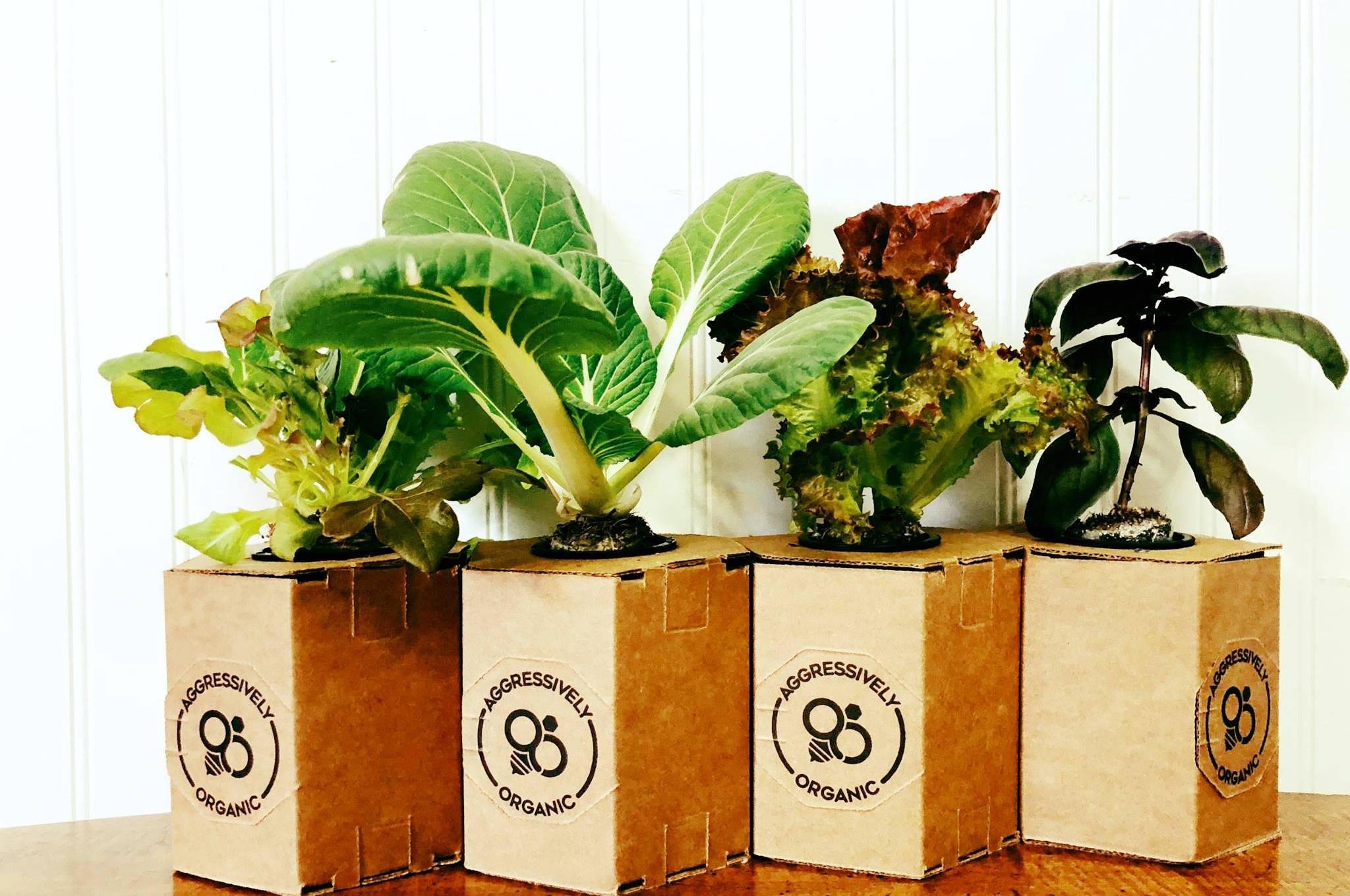Aggressively Organic Touts New Growing Method: ‘Lettuce’ Prove It
 The company's starting point is five types of lettuces and herbs
The company's starting point is five types of lettuces and herbs
Subscriber Benefit
As a subscriber you can listen to articles at work, in the car, or while you work out. Subscribe NowAn entrepreneur in Fishers says he’s familiar with skeptics, but intends to prove them wrong one head of lettuce at a time. Which, amazingly, grows indoors. In a cardboard “box.” With only 16 ounces of water for months. And trumps every taste test with far more flavor than store-bought lettuce. Aggressively Organic founder and Chief Executive Officer Jonathan Partlow met one naysayer—a plant physiologist—who insisted plants wouldn’t grow using Aggressively Organic’s method. But now he’s on staff and part of the startup’s pursuit to turn traditional plant-growing on its head.
“My plant physiologist tells me all the time, ‘It’s hard for me to believe it, and I’m holding it in my hand,’” says Partlow.
While its products vary in size, Aggressively Organic’s smaller Micro Growth Chambers are, indeed, little enough to hold in one’s hand. Each plant grows inside a corrugated cardboard oblong container in the shape of a hexagon. The plant’s roots sit in a pod—much like a coffee K-cup—with the roots extending into a small bag of water held inside the chamber.
Fishers-based Aggressively Organic’s method relies on hydroponics, which is growing plants in water with no soil. The startup advertises that the chambers can grow up to nine plants in one square-foot of space. Partlow says Aggressively Organic trades the typical requirements for hydroponic systems—such as specialized lighting, temperature controls and water pumps—for a self-contained cardboard box.
Partlow notes a head of lettuce grown conventionally needs about 25 gallons of water, but a head of lettuce in a Micro Growth Chamber requires only 16 ounces. He acknowledges it almost sounds too good to be true.
“The absurdity of us as human beings is we always believe that we have to intervene. But I started with an approach that was designed for simplicity,” says Partlow. “[The Micro Growth Chambers] can grow 365 days per year, 24 hours per day, and you only need to water them every 30 to 60 days, depending on the plant.”
The company’s sweet spot—or at least its starting point—is five types of lettuces and herbs, including arugula, basil, and specialty lettuces that aren’t commercially grown. The chambers come with 11 seed options, or the customer can plant their own. Partlow says the lettuces are more nutrient dense and flavorful than what an Indiana grocery sells, because store produce arrives on shelves days after being cut and must be shipped across the nation from the southwestern U.S.
“I have a family of five [using the Micro Growth Chambers], and even with eating it and juicing every day, we still can’t eat it quickly enough; we’re not eating as much as we produce, and we’re growing in an apartment,” says Partlow. “It’s to the point where it’s absurd on the abundance. I’m in charge of salads wherever I go at this point.”
The startup says it sold about 10,000 units in its first round, mostly to home growers, as well as some schools and a small number of commercial operations. The units cost around $20 each and were manufactured in Indianapolis.
It was only a “training round” in Partlow’s eyes; he believes the business opportunities are endless, which is why the startup is focusing on licensing agreements that would customize the growing system for users’ needs.
“The patent is on the method. Our job is to work with partners in various spaces,” says Partlow. “We have developers who have called us, architects, landscapers, world-renowned chefs who want to white-label our product, school systems to build STEM programs, produce suppliers and distributors and some retail chains.”
The startup also wants the product to address food insecurity. Aggressively Organic recently launched a crowdfunding campaign to send 50,000 Micro Growth Chambers to Puerto Rico to aid in hurricane relief efforts.
“[Puerto Rico] is a humanitarian crisis. It may not be able to produce its own food for a year,” says Partlow. “Look at our system; we can ship 50 flat in a box, with 12 refills, for a total of 600 harvest cycles. A five-year-old can assemble it, add water, and eat off it in as soon as 21 days—and continue to for several months, depending on what it is.”
While the Puerto Rico effort is ongoing, the startup’s current strategy centers on raising about $2.5 million to ramp up its business and harness the endless ideas sprouting from a stunningly simple concept: food can be grown in a box.
Partlow says the startup’s first round of sales included two people in central Indiana who are using thousands of Micro Growth Chambers.
Partlow says, as a public-benefit corporation, the startup heavily considers its carbon footprint.
